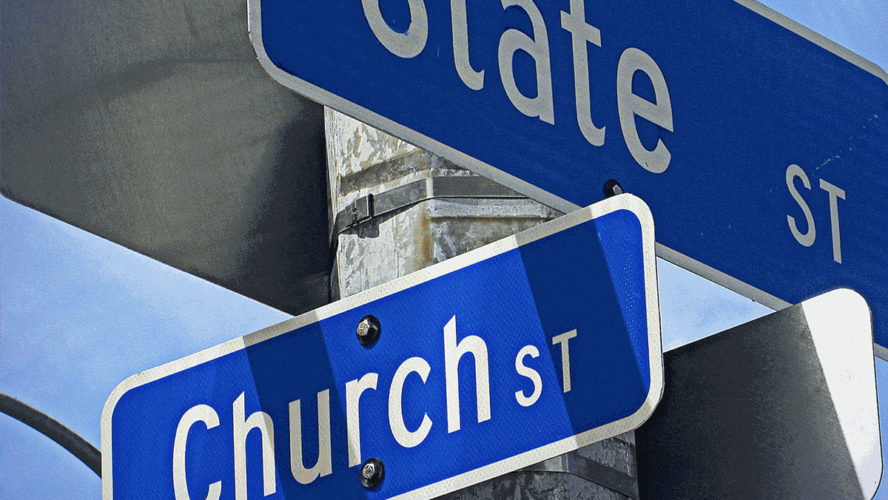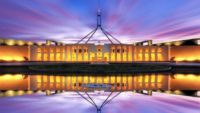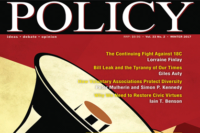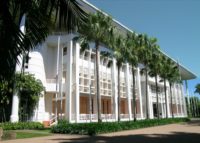Our society is made up of lots of different groups with different views on what makes for a good life. Atheist and religious. CLP and Labor. Socialists and capitalists. Gay and straight. AFL and NRL. Darwin Buffaloes and Southern Districts Crocs supporters.
Having a diversity of groups with a diversity of views is a sign of a healthy democracy. People are free to join with others whose views and causes they believe in, and are free to not join with others whose views and causes they disagree with. We value that freedom to associate, and not to associate, with others. We value different groups expressing their different visions of what is good. It shows that we can live and let live.
Our anti-discrimination law lets many organisations form to advance a cause to discriminate in employing people by selecting those who believe in and will be ambassadors for the cause. Political bodies like the Greens aren’t forced by law to employ climate change deniers and the ALP doesn’t have to employ union haters. Imagine if they did. Religious bodies don’t have to employ people whose beliefs or actions flatly contradict the religion. And clubs to preserve minority cultures don’t have to accept as members people who don’t fit the culture. And fair enough. Our society values a diversity of organisations representing different views and cultures. To have that diversity, those organisations need the freedom to choose to employ people who believe in and will be ambassadors for the organisation’s cause.
The NT government is considering proposed changes to the Anti-Discrimination Act which will limit that freedom (but only for religious organisations and associations). The proposed law will force religious schools to apply to the Anti-Discrimination Commissioner for permission to require that a potential or current employee must believe in the religion and conform to the values of the religion. That includes all teachers and staff in a religious school. And any owner or occupier of a religious site, other than a registered aboriginal sacred site, which restricts access to the site e.g. to people of the religion (e.g. the religious association restricts prayer times in mosques to Muslims or restricts hiring Mosque or church facilities to groups which want to conduct anti-religious activities) would have to get the Commissioner’s permission to do so. Subject to an appeal to NCAT, that permission could be refused or could be given on all sorts of conditions and for a limited time so the organisation had to re-apply and demonstrate progress on whatever set of “equality” measures the government in the form of the current Commissioner thought appropriate.
If the Commissioner says no, the religious school will have to take on employees who don’t agree with the basic values of the organisation or pay compensation. The law will effectively remove the ability of parents to send their children to a religious school where all the staff are selected to express and live out the values of the religion. But why? The discussion paper hints that this is to provide access for LGBTI people to such jobs, but it provides no evidence that such people can’t get equivalent jobs in government or other independent schools.
The proposed changes will make it very difficult for, say, a Christian school which seeks to educate students how to live and think as Christians to knock back an applicant for a teaching role on the basis that applicant is a Muslim or is a person who advocates a swinging sex life with multiple partners, contrary to traditional Christianity. Or the other way around: Muslim schools would have the same problem if a Buddhist or a swinger applied for a similar position. A church (or mosque) would have to justify to the Commissioner why its worship centre hall wouldn’t be hired out for atheist association meetings or Tinder meetups.
The proposed law will make it hard for religious schools and religious facilities to maintain their religious identity and culture. Imagine if the Darwin Buffaloes Club were forced to accept one-eyed Southern Districts Crocs supporters as coaching staff or as members of the Buffaloes cheer squad. How would that work? Or what about a political party? Imagine if an ALP MP or the party could not refuse to hire a union buster activist as their election campaign manager? It wouldn’t work.
Organisations should be allowed to choose to employ people who will uphold their core values, rather than undermine them.
The second problem is that the proposed changes contain a massive double-standard. Religious schools will all need to justify to the government their “conformity to values” requirements in employment. But not political parties or organisations. Not clubs for minority cultures. No one else is affected except religious groups.
Political parties and organisations can hire or sack a person for political beliefs or activities which don’t match the party’s. And they don’t have to justify their decision to the Commissioner. A gay men’s club, set up to preserve a minority culture, can refuse to have members who aren’t gay men. And they don’t have to justify their decision to the Commissioner.
Those organisations can rightly maintain the integrity of their values in hiring and membership decisions. But why should religious schools have to get government approval to maintain the integrity of their values in hiring? Especially when many Territorians choose to pay fees (on top of their taxes) to send their kids to the local Christian school or other religious schools precisely because they want the values of the religion taught and modelled to their children by all the staff at the school.
The proposed law will undercut the ability of religious organisations to continue to be true to their basic beliefs and values. And if it doesn’t make sense to do that to the Darwin Buffaloes or the CLP, the ALP or the Greens, it doesn’t make sense for religious organisations either.
A PDF version of this paper can be downloaded here.
Mark Sneddon is the Executive Director of the Institute for Civil Society








Recent Comments